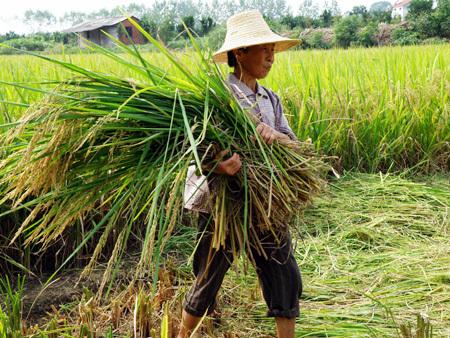
Harvesting rice at a farm in Yichang, Hubei province. China had a record grain crop of 546 million tons in 2010. [Photo / China Daily]
Drought, flooding seem to have had limited effect on yields this year
BEIJING - Despite the unfavorable weather, the Chinese government is "confident" about a good grain harvest this year, a senior agriculture officer said on Wednesday.
"A good harvest will help ease the price increases in agricultural products and maintain the stable development of China's economy this year," said Chen Xiwen, general director of the Office of the Central Rural Work Leading Group, at a forum in Beijing.
But it remained unclear whether the country could increase its harvest for an eighth consecutive year, Chen said.
China had a record grain harvest of 546 million tons in 2010. However, following a severe drought in the spring, rain-triggered flooding swept through provinces downstream of the Yangtze River last month. The flooding has prompted worries over this year's grain harvest, putting an upward pressure on the nation's skyrocketing inflation rate.
The effect of the weather extremes turned out to be not as serious as expected. "China got through severe drought and flooding this year and secured an increase in the summer grain harvest," Agriculture Minister Han Changfu said in a statement posted on the ministry's website.
The weather's effect on the early rice crop "is quite limited", Chen said.
"We have achieved a marvelous harvest for the first half of this year," he said. "Everything now depends on the autumn crops."
But the natural disasters still sent price fluctuations through the food market, giving rise to inflationary expectations. China's consumer price index, the major gauge of inflation, rose to the 34-month high of 5.5 percent in May, mainly driven by surges in food prices, according to the National Bureau of Statistics.
The country's annual inflation rate in June is expected to surpass the peak in May, before gradually declining in the latter half of the year, according to a statement from the National Development and Reform Commission, China's top economic planner.
Premier Wen Jiabao said on Tuesday in an official statement that the government has already contained the inflationary pressure, but has yet to eliminate it.
"Stabilizing consumer prices remains the top priority of our macroeconomic regulation," Wen said during a visit to Northeast China's Liaoning province on Sunday and Monday. "Prices will be effectively controlled as government policies take effect."
Chen Xiaohua, vice-minister of agriculture, said the fluctuating market is partly caused by a defective market system for agricultural commodities.
"China's market system for agricultural products is still at an elementary stage," he said.
"We need to develop the logistics system, especially cold chain logistics, and upgrade the wholesale market."
Logistics accounts for 70 percent of the cost of vegetables and fruits in China, according to the ministry.
According ministry data, the current cold chain logistic system carries only 10 percent of the meat and 10 percent to 20 percent of vegetables and fruits to the market.
Improving the logistics system and the wholesale market could effectively stabilize food prices "at a reasonable level", vice-minister Chen said.





